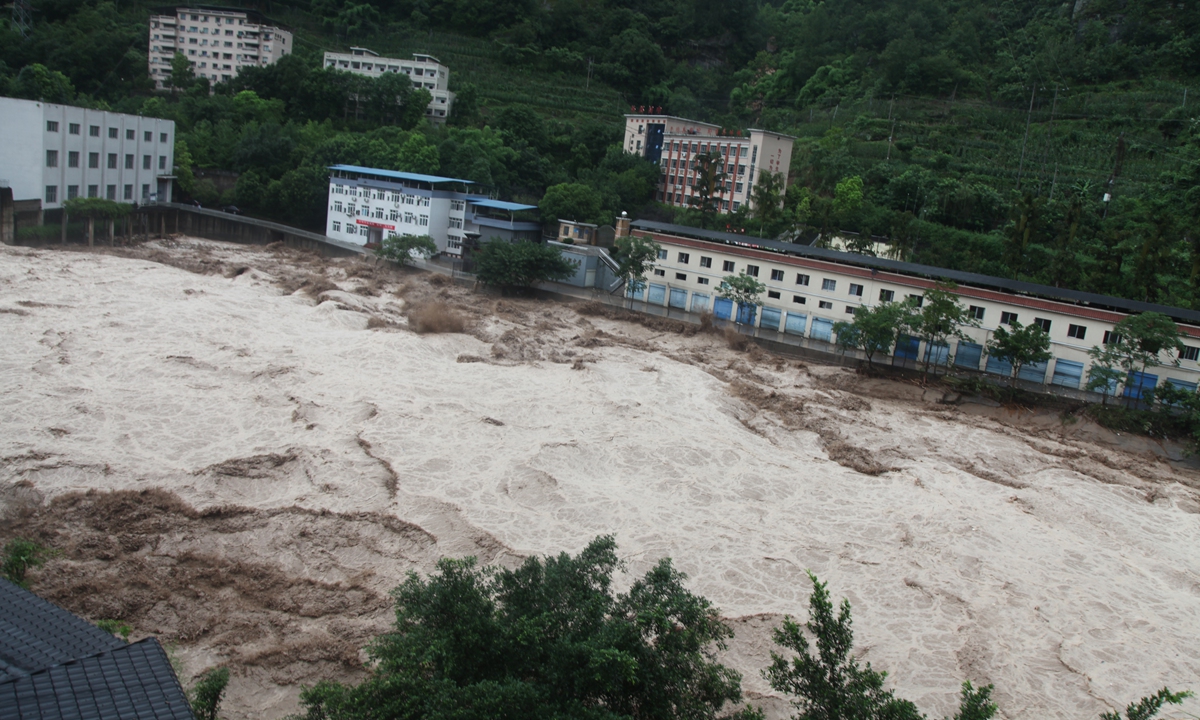China warns of more extreme weather in summer as heavy rains pelt the south, heat grills the north

Chongqing's flood control and drought relief authority initiated a flood control emergency response on July 3, 2023. Photo: from IC.
China may face more extreme weather events during July and August, including heavy rainfall, flooding and heat waves, said the weather monitoring authority on Tuesday, as the country has been hit by both torrential rain and high temperatures since June.
During the peak summer period in 2023, the lower sections of the Yangtze River may see severe flooding and high temperatures may continue in the northern part of China, China's National Climate Center (NCC) said on Tuesday based on conclusions reached at a recent conference which gathered experts to forecast the national climate trends and major meteorological disasters .
The warning comes as torrential rain pelts China's southwestern regions including Southwest China's Chongqing Municipality and Sichuan Province, whereas the northern region is suffering from drought, including North China's Inner Mongolia Autonomous Region and Hebei Province.
Chongqing has experienced the strongest rainfall since the beginning of the flood season. On Tuesday morning, a local hydrological monitoring station issued three yellow flood alerts after a heavy rainstorm hit its 24 districts from Monday to Tuesday, swelling multiple rivers beyond the alert level and even the danger level, and causing the partial collapse of a railway bridge.
Chongqing is not alone in facing potential flooding. More than 85,000 residents have been evacuated in advance in its neighboring province of Sichuan to avert risks brought by heavy rains. Zhenba county in Shaanxi encountered a very rare super heavy rainstorm which reportedly happens only once every 50 years, as the province has received widespread rain this month, making roads in some towns and cities impassable.
On Tuesday, the Ministry of Housing and Urban-Rural Development and the Ministry of Emergency Management required all regions to further improve their emergency mechanisms for drainage and flood control to ensure the safety of cities during this year's flood season.
At the same time, high temperature is forecast for the northern region of the country in the next week, and in some areas in Hebei, Shandong and Henan it could possibly exceed 40 C, following the record-breaking grilling in June, according to China Meteorological Administration, which warned risks of heatwaves in Beijing, Tianjin, Hebei, Shandong and Henan.
NCC announced on Sunday that the country has recorded the highest number of hot days in the past six decades, and that the occurrence of multiple heat waves engulfing the country's northern cities is extremely rare.
The extreme weather conditions with heavy rains and high temperatures this year have come earlier in summer, which roughly corresponds to the development stage of El Niño, Ma Jun, director of the Beijing-based Institute of Public and Environmental Affairs, told the Global Times on Tuesday, saying the extreme heat came earlier not just in China, but also in India, the US, Mexico and countries in Southeast Asia.
Ma said the trend of the increasing number of extreme weather events is a result of the worsening global climate change. "The global carbon emissions have increased instead of decreased over the past two years as the security of food, energy and supply chains have become many countries' priority due to the COVID-19 pandemic and the Ukraine crisis," Ma said.
Ma said currently it is challenging to achieve the goal of limiting global warming to no more than 1.5 C above pre-industrial levels by 2100. "The current average temperature increase of 1.1 degrees has already resulted in numerous extreme weather events. If reaching 1.5 C, we would very likely have more unpredictable and extreme weather conditions," said Ma.



